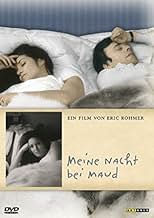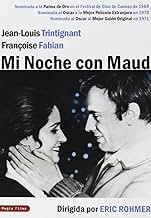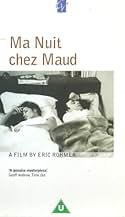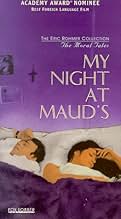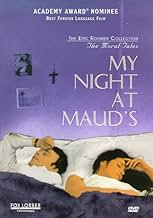अपनी भाषा में प्लॉट जोड़ेंA devout Catholic man's rigid principles are challenged during a one-night stay with Maud, a divorced woman with an outsize personality.A devout Catholic man's rigid principles are challenged during a one-night stay with Maud, a divorced woman with an outsize personality.A devout Catholic man's rigid principles are challenged during a one-night stay with Maud, a divorced woman with an outsize personality.
- निर्देशक
- लेखक
- स्टार
- 2 ऑस्कर के लिए नामांकित
- 6 जीत और कुल 6 नामांकन
फ़ीचर्ड समीक्षाएं
These are among the reasons, I think, for the freshness of the movie. Because the way people talk, cherish their own opinions and express emotions is something which still happens today in human relationships! The film contains exactly situations of the ordinary life -you don't see that movie and think "It's only a film!".
Good performance -as always- of Jean-Louis Trintignant and superb black and white cinematography by Nestor Almendros.
Two men, Jean-Louis and Vidal meet again after 15 years. They decide to go to visit Vidal's friend, Maud. In Maud's apartment the group of three have interesting discussions about Pascal, philosophy, moral and religion. What makes these discussions so interesting is the difference of Vidal, Jean-Louis and Maud. Jean-Louis is a catholic who believes in the holiness of man. Vidal is a Marxist who replaces God with history, he believes in history instead of God. Maud is an atheist, who believes in true short-term happiness. When Vidal leaves the apartment, Jean-Louis gets to a moral dilemma.
Jean-Louis talks a lot about a young blond woman he saw in church, Francoise. He doesn't know anything about her, but she represents religious and an ideal woman to him. Where Maud is the opposite to him. Jean-Louis doesn't believe in short-term happiness. So as he spends the night at Maud's he gets to a moral dilemma. According to his religious beliefs he should resist the temptation of Maud. Again his lie to Francoise is Christian compassion, but it's also a desire to hide his dishonesty.
My Night at Maud's goes very deep. It's not just about what's on surface: the intellectual dialogs and the moral dilemmas. The intelligence of Rohmer goes much deeper. And that is what I like in his films, even if you don't understand everything, the films have something that make you watch them again and again. I'm 17 and when I walked into a dark theater to see this fine film, I was blown away. When the film is over, you have came from a moral journey. So Eric Rohmer's film, obviously doesn't just stop at being the battlefield of ideologies.
Because it is a dialogue-driven piece, much more happens in the 54-minute-long "Suzanne's Career", Rohmer's second moral tale, than in "My Night at Maud's", which is about an hour longer. It can seem meandering at times, especially the first-half of the film, but put your trust in Rohmer. We're being bored to death for a reason. Listening to two Frenchmen discuss Pascal's Wager isn't very entertaining, but the payoff comes when, later on in the film, the characters are put into situations in which they have to make their own Pascal's wager, metaphorically speaking. The reward comes when we see these philosophies which they discussed tested in real-life situations, and we see how true, or untrue, to their ideals these characters are.
During the first fifty minutes, you may be bored out of your skull, but the way the film unfolds, you'll probably want to go back and watch the first fifty minutes again after it's over.
After Vidal leaves, Maud tells Jean-Louis about her marriage, her ex-husband's Catholic mistress, and the tragic end to her affair with the only man she truly loved. When he is persuaded to avoid a snowstorm and stay overnight, Jean-Louis has to overcome Maud's advances and his own temptations to remain faithful to his ideal mate, a blond, Catholic girl (Marie-Christine Barrault) he recently met at church.
This was the first film I'd seen by Eric Rohmer and it was a puzzle to penetrate the uniqueness of his style and rhythm. Rohmer presents his characters in very natural, almost mundane situations, and heightens the realism by using only natural sounds of the environment. On the surface, the film appears very simple but underneath there is much complexity. Jean-Louis is conflicted between his Catholic principles and his love of sensual pleasure. He lives in a world centered almost entirely on himself, engaging in much philosophizing about choice but never choosing. He operates out of how he "should" or "should not" act rather than out of his experience of what works. When life does not fit his pictures, he deceives himself with endless rationalizations. Through his experience with Maud, however, he is shaken out of need for complete self-control and discovers the epiphany of grace.
Rohmer has a light touch and employs intelligent and witty dialogue to bring his characters to life. In the process, he creates an impersonal elegance that is totally captivating. Rohmer doesn't set out to change our lives just to make us think, and in My Night at Maud's, he succeeds admirably.
"My Night at Maud's" is a spectacular work of art, which mainly consists of the intelligent discussion that goes on in the apartment of a woman named Maud over the coarse of one night. Of course, plenty of other things happen as well, but most of the film takes place during this one long discussion. Joining Maud is the main character, Jean-Louis, a Catholic man who seems to be in love with a woman (named Françoise, who becomes more of a major character later in the film), but hides it from Maude and his Marxist friend Vidal.
The film is an hour and 50 minutes of watching these wonderful characters talk and talk about various things, mainly things dealing with religion, love, etc. While a film almost entirely consisted of various characters chattering away may sound boring, it really isn't, mainly because the talking is so much fun (and really interesting) to listen to!
The film is also beautiful to look at, with gorgeous, black and white cinematography that really enhances the pretty cold tone of the film.
A really great piece of filmmaking!
क्या आपको पता है
- ट्रिवियाJean-Louis Trintignant's character is never called by name in the entire film. He is shown in credits as "Jean-Louis."
- गूफ़When Jean-Louis Trintignant accepts to climb into bed with Françoise Fabian, he motions for her to pass him the blanket, extending his right hand holding a lit cigarette. The next shot from the side shows him grasping the blanket with a cigarette-free right hand.
- भाव
Jean-Louis: Are you still a Marxist?
Vidal: Absolutely. For a Communist, Pascal's wager is very relevant today. Personally, I very much doubt that history has any meaning. Yet I wager that it has, so I'm in a Pascalian situation. Hypothesis A: Society and politics are meaningless. Hypothesis B: History has meaning. I'm not at all sure B is more likely to be true than A. More likely the reverse. Let's even suppose B has a 10% chance of being true and A has 80%. Nevertheless I have no choice but to opt for B, because only the hypothesis that history has meaning allows me to go on living. Suppose I bet on A, and B was true, despite the lesser odds. I'd have thrown away my life. So I must choose B to justify my life and actions. There's an 80% chance I'm wrong but that doesn't matter.
Jean-Louis: Mathematical hope. Potential gain divided by probability. With your hypothesis B, though the probability is slight, the possible gain is infinite. In your case, a meaning to life. In Pascal's, eternal salvation.
Vidal: It was Gorky, Lenin or maybe Mayakovsky who said about the Russian revolution that the situation forced them to choose the one chance in a thousand. Because hope became infinitely greater if you took that chance than if you didn't take it.
- कनेक्शनFeatured in The 82nd Annual Academy Awards (2010)
टॉप पसंद
विवरण
बॉक्स ऑफ़िस
- दुनिया भर में सकल
- $11,088
- चलने की अवधि1 घंटा 50 मिनट
- रंग
- ध्वनि मिश्रण
- पक्ष अनुपात
- 1.33 : 1
इस पेज में योगदान दें



